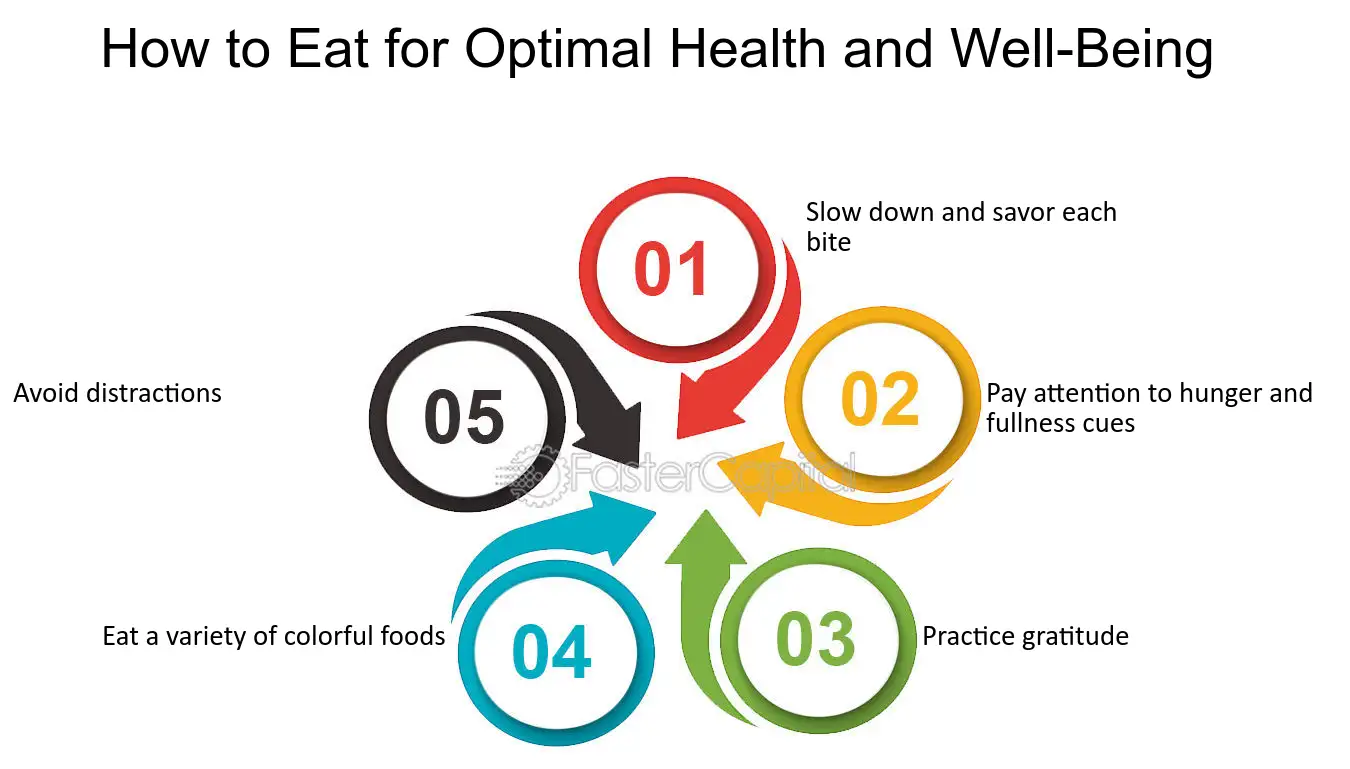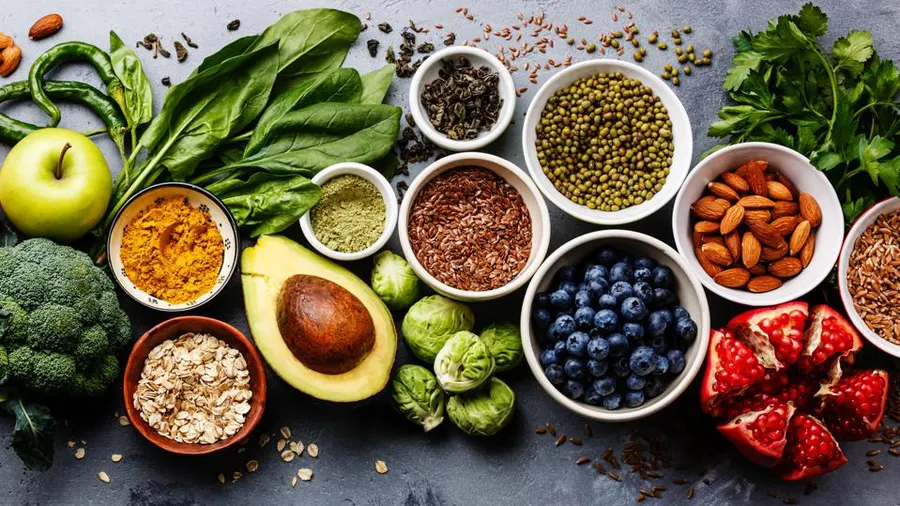Introduction
. Start with the importance of a balanced diet for overall health and well-being.
. Briefly mention how diet impacts physical health, mental well-being, and longevity.
1. Foods to Eat for Optimal Health

1.1 Whole Grains
Examples: Brown rice, quinoa, whole wheat, oats, barley.
Benefits: Whole grains are rich in fiber, which aids digestion, helps control blood sugar levels, and supports heart health. They are also packed with essential nutrients like B vitamins, iron, and magnesium.
1.2 Fruits and Vegetables
Examples: Leafy greens (spinach, kale), berries (blueberries, strawberries), citrus fruits (oran lemonsges,), cruciferous vegetables (broccoli, cauliflower).
Benefits: Fruits and vegetables are high in vitamins, minerals, and antioxidants that protect against chronic diseases. They are also low in calories and high in fiber, which promotes satiety and healthy digestion.
1.3 Lean Proteins
Examples: Chicken breast, turkey, fish (salmon, tuna), legumes (beans, lentils), tofu.
Benefits: Protein is essential for muscle repair, immune function, and the production of hormones and enzymes. Lean proteins are lower in saturated fats, making them heart-friendly.
1.4 Healthy Fats
Examples: Avocados, nuts (almonds, walnuts), seeds (chia seeds, flaxseeds), olive oil, fatty fish.
Benefits: Healthy fats, particularly omega-3 fatty acids, support brain health, reduce inflammation, and improve heart health. They also help in the absorption of fat-soluble vitamins (A, D, E, K).
1.5 Dairy or Dairy Alternatives
Examples: Low-fat yogurt, milk, cheese, fortified plant-based milks (almond, soy, oat).
Benefits: Dairy products are rich in calcium and vitamin D, which are essential for bone health. For those who are lactose intolerant or vegan, fortified plant-based alternatives provide similar benefits.
2. Foods to Avoid or Limit for Better Health
2.1 Processed Foods
Examples: Packaged snacks, ready-to-eat meals, processed meats (bacon, sausages), sugary cereals.
Why to Avoid: Processed foods are often high in added sugars, unhealthy fats, and sodium, which can increase the risk of obesity, heart disease, and other chronic conditions.
2.2 Sugary Beverages
Examples: Sodas, energy drinks, fruit juices with added sugar.
Why to Avoid: Sugary beverages contribute to weight gain, type 2 diabetes, and tooth decay. They provide empty calories with little to no nutritional value.
2.3 Trans Fats
Examples: Margarine, fried foods, baked goods (cookies, cakes), processed snacks.
Why to Avoid: Trans fats raise bad cholesterol (LDL) and lower good cholesterol (HDL), increasing the risk of heart disease, stroke, and type 2 diabetes.
2.4 Refined Carbohydrates
Examples: White bread, white rice, pastries, pasta made from refined flour.
Why to Avoid: Refined carbs have been stripped of their fiber and nutrients, leading to rapid spikes in blood sugar levels. They are also less filling, which can contribute to overeating.
2.5 High-Sodium Foods
Examples: Canned soups, fast food, salty snacks, processed meats.
Why to Avoid: Excessive sodium intake is linked to high blood pressure, heart disease, and kidney problems. Reducing sodium can help maintain healthy blood pressure levels.

3. Tips for a Balanced Diet
3.1 Portion Control
.Discuss the importance of mindful eating and controlling portion sizes to avoid overeating.
.Provide tips on how to measure portions and eat slowly to recognize fullness cues.
3.2 Reading Nutrition Labels
Explain how to read and understand nutrition labels to make informed choices about what to eat.
Highlight key things to look for, such as serving size, ingredients list, and daily value percentages.
3.3 Meal Planning and Preparation
Encourage meal planning and preparing meals at home to have control over ingredients and portion sizes.
Offer simple meal prep ideas and tips for staying consistent with healthy eating.
4. Special Considerations
4.1 Dietary Needs for Specific Health Conditions
Discuss how certain diets (e.g., low-carb, Mediterranean, DASH) are tailored for specific health conditions like diabetes, heart disease, or hypertension.
4.2 Supplements and Vitamins
Address the role of supplements in filling nutritional gaps, but emphasize the importance of getting nutrients from whole foods first.
4.3 Hydration
Highlight the importance of drinking enough water throughout the day and how hydration plays a role in overall health.
Fruits You Should Eat for Optimal Health
Incorporating a variety of fruits into your diet is essential for maintaining good health. Fruits are rich in vitamins, minerals, fiber, and antioxidants, all of which play a crucial role in supporting your overall well-being. Here are some fruits you should consider eating regularly: more read
Berries
Examples: Blueberries, strawberries, raspberries, blackberries.
Benefits: Berries are packed with antioxidants, particularly anthocyanins, which help reduce inflammation and protect against chronic diseases like heart disease and cancer. They are also high in fiber, which supports digestive health and helps regulate blood sugar levels.
Citrus Fruits
Examples: Oranges, lemons, grapefruits, limes.
Benefits: Citrus fruits are an excellent source of vitamin C, which boosts the immune system, promotes skin health, and helps the body absorb iron from plant-based foods. They also contain flavonoids, which have antioxidant and anti-inflammatory properties.
Apples
Benefits: Apples are rich in fiber, particularly pectin, which aids in digestion, supports heart health, and helps regulate blood sugar levels. They also contain various antioxidants like quercetin, which may reduce the risk of chronic diseases.
Bananas
Benefits: Bananas are a great source of potassium, which is essential for heart health and maintaining healthy blood pressure levels. They also provide quick energy due to their natural sugars and are a good source of fiber, which supports digestion.
Mangoes
Benefits: Mangoes are rich in vitamins A and C, both of which support immune function and skin health. They also contain digestive enzymes that aid in digestion and antioxidants that protect against cellular damage
Grapes
Benefits: Grapes contain high levels of resveratrol, an antioxidant that has been linked to heart health and anti-aging effects. They are also a good source of vitamins C and K, as well as fiber.
Kiwifruit
Benefits: Kiwifruit is exceptionally high in vitamin C, which supports immune health and skin vitality. It also contains fiber, vitamin K, and antioxidants that promote heart health and digestive well-being.
Pineapple
Benefits: Pineapple contains bromelain, an enzyme that helps with digestion and has anti-inflammatory properties. It is also rich in vitamin C and manganese, both of which support immune function and bone health.
Avocados
Benefits: Although technically a fruit, avocados are high in healthy monounsaturated fats, which are good for heart health. They also provide fiber, potassium, and a variety of vitamins and minerals that support overall health.
Papaya
Benefits: Papaya is rich in vitamin C and contains the enzyme papain, which aids in digestion. It also provides antioxidants like beta-carotene, which supports eye health and reduces the risk of chronic diseases.
Pomegranates
Benefits: Pomegranates are loaded with antioxidants, particularly punicalagins, which have been shown to reduce inflammation and lower the risk of heart disease. They also support healthy blood pressure and cholesterol levels.
Cherries
Benefits: Cherries are rich in antioxidants like anthocyanins and melatonin, which support sleep quality, reduce inflammation, and promote heart health. They also provide vitamins C and A, as well as fiber.
Watermelon
Benefits: Watermelon is hydrating and low in calories, making it a great fruit for weight management. It also contains vitamins A and C, as well as antioxidants like lycopene, which supports heart health and may reduce the risk of certain cancers.
Conclusion
Incorporating a variety of these fruits into your diet can provide essential nutrients, support overall health, and reduce the risk of chronic diseases. Each fruit offers unique benefits, so enjoying a diverse selection ensures you get a broad spectrum of nutrients necessary for optimal health.


